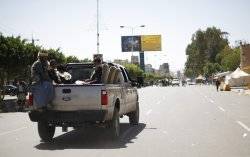Yemen's Shia Houthi fighters continue to push south in Ibb province, taking over the town of Yarim after dismantling a protest camp blocking the country's main airport in the capital Sanaa.
Sunday's developments came amid reports that the governor of Sanaa province had resigned after his headquarters were stormed by the Houthis.
The Houthis captured Sanaa on September 21 after weeks of anti-government protests centering on fuel-price rises.
The group signed a power-sharing agreement with other political parties soon afterwards, a deal that was sanctioned by President Abd-Rabbu Mansour Hadi, but this has not deterred them from pushing in to other parts of Yemen.
The group also said on Sunday it was keeping its fighters on the streets of Sanaa.
The dismantling of the encampment, which allowed traffic to move unobstructed between the airport and Sanaa for the first time in weeks, came as Khaled Bahah, Yemen's ambassador to the UN, flew back home to take up his post as prime minister as part of an agreement.
Terms of agreement
Under the terms of the power-sharing agreement, the Houthi group was supposed to start dismantling the protest encampment and withdraw its fighters from Sanaa once a new prime minister had been appointed.
The Yemeni Defense Ministry's website said on Sunday that the encampment had indeed been dismantled
"The airport road has been opened after the tents were removed [on Saturday] in implementation of the partnership and peace agreement," the website said, quoting an official at Sanaa municipality.
"Life in neighborhoods of the airport road is back to normal."
But residents of Sanaa said Houthi fighters were still in control of the city, operating checkpoints and keeping guard outside key ministries, commercial districts and diplomatic missions.
The Houthis, who hail from Yemen's northern highlands and champion the interests of the Zaidi community that makes up a fifth of Yemen's 25 million population, are starting to impose their authority outside Sanaa as well as in it.
The group wants the northern part of the country to be one region instead of three and they are also seeking a bigger say in drafting the constitution.
Risk of confrontation
The Houthis began expanding their influence in other parts of the country this week, risking confrontation with armed Sunni groups, including al-Qaeda in the Arabian Peninsula (AQAP), the local arm of al-Qaeda.
Houthi fighters last Tuesday were deployed to the Red Sea port city of Hodeidah.
Though they met little resistance at the time, on Saturday activists told Reuters news agency that residents had taken to the streets calling on the Houthis to leave.
A statement distributed after the protests said residents of the coastal Tihama region "rejected the presence of armed militias" and pledged to resist the group.
Houthi fighters also clashed with supporters of the conservative Sunni Muslim Islah party in Ibb province on Saturday, residents and local officials said.
The fighting took place in the town of Yarim, and came after 15 people were killed the previous day in clashes between Sunni tribesmen and the Houthis in and around the provincial capital Ibb, which lies 150km south of Sanaa.
Saturday's clashes erupted after Houthi fighters attacked the home of a local Islah official, Ali Bdeir, residents said.
The Houthi raid came after four members of the group were killed in a dawn ambush in the town.
A truce appeared to be holding and residents said that local authorities were trying to get both sides to agree to withdraw their fighters from the city.
PHOTO CAPTION
Houthi Shiite rebels riding on a pickup truck, patrol a street while other members dismantle a protest camp on a road leading to the Sanaa Airport in Sanaa, Yemen, Friday, Oct. 17, 2014.
Aljazeera


 Home
Home Discover Islam
Discover Islam Quran Recitations
Quran Recitations Lectures
Lectures
 Fatwa
Fatwa Articles
Articles Fiqh
Fiqh E-Books
E-Books Boys & Girls
Boys & Girls  Hajj Rulings
Hajj Rulings Hajj Fatwas
Hajj Fatwas














